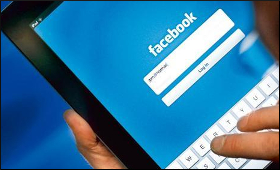|

|
Facebook wants to launch own Internet satellite in 2019: Report
|
|

|
|
| Top Stories |
 |
|
|
|
IANS | 21 Jul, 2018
As part of its plan to connect billions of people who are still offline,
Facebook is working on launching Athena, its own Internet satellite,
early in 2019, the WIRED reported.
According to an application
Facebook appears to have filed with the US Federal Communications
Commission (FCC) under the name PointView Tech LLC, the project is
designed to "efficiently provide broadband access to unserved and
underserved areas throughout the world," the report said on Friday.
Facebook,
however, is not alone in aiming to increase Internet accessibility
through satellites in low Earth orbit. Elon Musk's SpaceX and
Softbank-backed OneWeb are two other prominent names who have similar
ambitions.
Facebook also confirmed that Athena is their project, according to the report in the WIRED.
"While
we have nothing to share about specific projects at this time, we
believe satellite technology will be an important enabler of the next
generation of broadband infrastructure, making it possible to bring
broadband connectivity to rural regions where Internet connectivity is
lacking or non-existent," a Facebook spokesperson was quoted as saying
in a statement.
While Facebook had long expressed its cherished
goal of connecting billions of underserved people around the world, it
has not had much success with two earlier projects.
In June,
Facebook announced it decided to abandon its plan to develop high-flying
solar-powered drones called Aquila that was aimed to deliver Internet
to nearly four billion people in remote parts of the world.
A
high altitude platform station (HAPS) system, Aquila's mission,
according to Facebook CEO Mark Zuckerberg, was to connect the world and
help people who do not have online access all the opportunities of the
Internet.
Facebook began Aquila project in 2014. In 2017, the
solar-powered drone successfully completed the second full-scale test
flight.
The social network also discontinued in 2017 a small
helicopter drone project that could temporarily replace cellular
services in emergency situations, The Verge reported.
The idea
was to send a helicopter equipped with telecommunications equipment
hundreds of metres up in the air to be able to tether to fibre and power
lines in places where wireless capacity was compromised due to disaster
or other factors.
|
|
|
| |
|
|
|
|
|
|
|
|
|
|
|
|
|
|
| |
| Customs Exchange Rates |
| Currency |
Import |
Export |
US Dollar
|
66.20
|
64.50 |
UK Pound
|
87.50
|
84.65 |
Euro
|
78.25
|
75.65 |
| Japanese
Yen |
58.85 |
56.85 |
| As on 13 Aug, 2022 |
|
|
| Daily Poll |
 |
 |
| PM Modi's recent US visit to redefine India-US bilateral relations |
|
|
|
|
|
| Commented Stories |
 |
|
|
|
|
|
| |
|